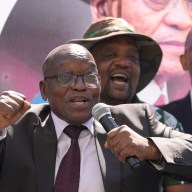 Credit: Getty Images
Credit: Getty Images
Russia recently arrested a young American diplomat, claiming he was a spy, then paraded him in front of TV cameras. Ryan Fogle, alleged Russia, had been caught trying to recruit a Russian to the CIA. At the same time, with a fierceness that would do the old KGB proud, Russia’s SVR intelligence energetically spies on the West, often using young Russian women.
Welcome to the new spy war. The global audience was first alerted to it three years ago, when Anna Chapman and nine other Russian spies were caught in the U.S. “The U.S. exposure of this sleeper cell was a disaster for the Russians, so Fogle could be payback,” explains Charles Crawford, a former British diplomat. Crawford worked at the country’s Moscow embassy when nine British diplomats were expelled, accused of being spies.
“There’s no question that Fogle’s arrest was staged,” says Peter Earnest, a 35-year CIA veteran who now serves as director of Washington’s International Spy Museum. “The question is, was it a sting operation?” (A sting operation involves an agent pretending to collaborate with the person whom officials then arrest.) Most TV viewers, when shown the equipment Fogle was reportedly caught with — including two wigs – doubted the story, concluding that Fogle seemed too amateurish to be a real CIA spy. “But this is the kind of equipment you have to use in Moscow,” notes Earnest. “With 24/7 surveillance, wearing wigs makes sense.” After Fogle’s arrest, Russia expelled a former U.S. diplomat, reportedly because he’d refused recruitment offers by the FSB. So what’s the truth about Fogle? The public may never find out.
Of course, espionage never ceases. But for a while, Russia and the U.S. seemed to be working together, with Islamist militants forming the all-important foe. They still do – sort of. “It’s in the Russians’ interest to talk with us about some things, like Syria and the Boston bombings,” notes Earnest. In fact, the Boston killings strengthened Vladimir Putin’s long-standing argument that Islamists in the Caucasus are a serious threat. “The Russians are poring over thousands of phone records between people in the Caucasus and their friends and family in the U.S.,” observes Crawford. “They might find a couple of interesting leads. The question is, do they tell the Americans?”
But such collaboration against a common foe has ceded into the background as Russia snoops on the West in an increasingly daring and high-profile fashion. In his new book “Spies, Lies And How Russia Dupes The West,” Economist editor Edward Lucas details how the SVR – the KGB’s foreign espionage successor — recruits Russian expats in the West, installs Russians in crucial Western companies, swarms Brussels with spies and intercepts huge quantities of communications through a listening station near the Finnish border. Lucas’ conclusion: While the West views Putin’s Russia as a bumbling former superpower, it’s outclassing us in the espionage war.
Anna Chapman, ex-spy celebrity
Apparently, failing as a spy is a great career move. Before her arrest, Anna Chapman was an unknown, but her very public expulsion from the U.S. made her a household name. And the Kremlin handsomely rewarded the redhead for her attempts at infiltrating the U.S.: After her return to Russia, she was appointed to the public council of the pro-Kremlin youth organization Molodaya Gvardiya (Young Guard).
Since then, the 31-year-old has hosted a TV show called “Secrets of the World,” written columns in the pro-regime newspaper Komsomolskaya Pravda and edited a business magazine.
Dead lawyer looming large
Ryan Fogle has been big news on Russian state TV recently, but so has an investigative documentary called “Swampland” that shows how the U.S. is funding “revolutionaries” in Russia. The documentary is, in a way, revenge for what the Kremlin sees as U.S. meddling in Russian affairs; specifically, Putin’s regime is angry over U.S. support for a dead Russian lawyer.
Sergey Magnitsky, who had uncovered tax fraud, died in prison under unexplained circumstances three and a half years ago, aged 37. Last year, Congress passed the Magnitsky Act, which bars certain Russian officials from traveling to the U.S. “The Magnitsky Act effectively delegitimizes Putin’s regime,” notes Russia analyst Kadri Liik. “Russians know that the regime is corrupt and even believe that Magnitsky was killed. The regime wants to punish the U.S. for the Magnitsky Act, but it also wants to discredit the U.S. in the eyes of Russian citizens, by making it appear that the U.S. is intervening in Russian affairs.”
Q&A
Lilia Shevtsova is an expert on the Kremlin and has received a Carnegie Endowment for International Peace, Moscow. She is also the author of “Putin’s Russia.”
Is Russia on a collision course with the U.S. and/or the West in general, or is it just a play for the domestic audience?
We have to use the word “the Kremlin.” There are different views on the West among the Russian elite. Foreign policy became for Putin a servant of domestic agenda. It has always been. But today, with the domestic mechanisms of retaining power in decline, foreign policy is becoming more important. No, Putin does not want a collision. He wants cooperation on the Kremlin’s terms. But at the same time he wants to contain the West inside Russia and outside, mainly in post-Soviet countries. This could mean more assertive Kremlin policy and a colder relationship.
Should we be worried about Russia’s increasing hostility?
You should be worried by three things. First of all, by the Kremlin’s growing hostility. Secondly, by the growing suspicion and frustration among Russian liberals who see the West’s connivance in its policy toward Russia’s regime. Thirdly, by the fact that Western policy towards Russia is undermining Western principles.
Who’s behind the current course? Just Putin or are there others as well?
Putin is presiding over the regime, but he represents the traditional part of the elite. They mutually reinforce themselves.
















